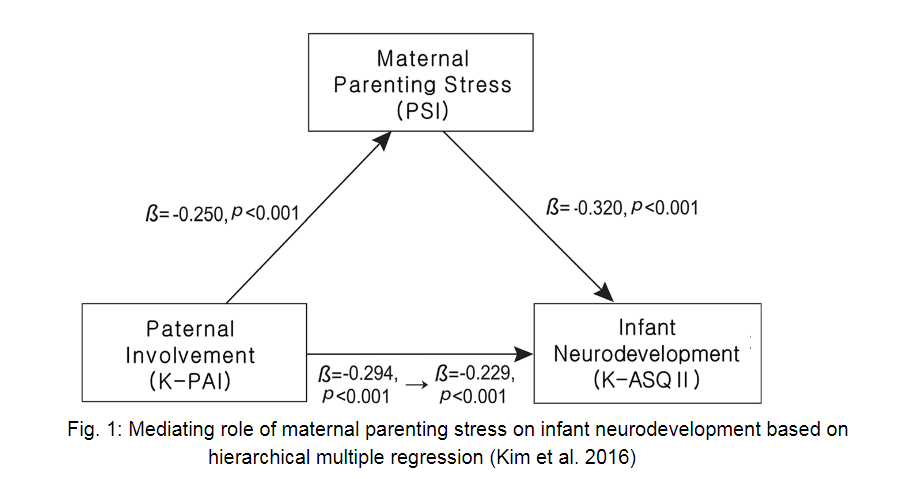It is fairly well-known that interactions between parents and children are associated with improved developmental outcomes in children. Previous research has primarily focused on how maternal rather than paternal involvement influences infant neurodevelopment. A recent study examines the direct and indirect relationships between paternal involvement and infant neurodevelopment, and how maternal parenting stress mediates this association.
The study was conducted in 2014 at Gachon University in South Korea with 255 mothers and their healthy infants (3 – 4 months in age). Only unemployed, married women without medical problems were selected to participate, and all infants with congenital malformations were excluded, in order to reduce heterogeneity of the sample. The strict inclusion and exclusion criterion applied in this study reduce the likelihood that confounding variables may influence outcomes, but the trade-off is that the results may not be generalizable to more diverse populations.
Mothers reported paternal parenting involvement and maternal parenting stress using the Korean Parenting Alliance Inventory (K-PAI) and the Parenting Stress Index (PSI), respectively. The PSI evaluates parental behavior and stress, as well the child’s behavior, the relationship between parents, and stress resulting from cultural and demographic factors. Experts in childhood education evaluated neurodevelopment through in-home visits where they observed infants for 90 minutes and completed the Korean version of the Ages and Stages Questionnaire II (K-ASQ II) with the mothers. An important limitation of this study is that the authors evaluated paternal involvement based on the mothers’ point of view, which could be biased. The K-PAI, based on the Parenting Alliance Measure (PAM), can, however, be completed by either parent. This decision was made based on a previous study in which fathers overestimated their own parenting involvement. Paternal involvement can include direct caretaking activities (i.e., feeding, changing diapers) or emotional support for their partners.
Multivariate analysis was conducted to control for demographic and socioeconomic status variables, and a Pearson’s correlation analysis tested the direct relationships between infant neurodevelopment and either maternal stress or paternal involvement. The mean K-PAI, PSI, and K-ASQ II scores were 55.5, 45.8, and 243.2, respectively.
Statistical analysis showed that paternal involvement positively influences infant neurodevelopment, while maternal parenting stress has a negative impact on infant neurodevelopment. Further analysis showed that the when fathers were positively involved in their infants’ lives, not only did infant neurodevelopment improve, but mothers’ stress was decreased.
The implication of this study is that paternal involvement not only positively affects infant neurodevelopment, but also decreases maternal stress and reduces maternal burden, which further contributes to healthy infant neurodevelopment. Overall, this study reveals that the mother-father relationship has an indirect effect on positive infant outcomes. Involving the father in child care will not only be beneficial for the growth of the infant, but can also decrease the mother’s risk for postnatal stress and/or depression.
Lauren Kobylski
Kim M, Kang S, Yee B, Shim S, Chung M. Paternal involvement and early infant neurodevelopment: the mediation role of maternal parenting stress. BMC Pediatrics [serial online]. December 12, 2016;16(1):212.









Leave A Comment